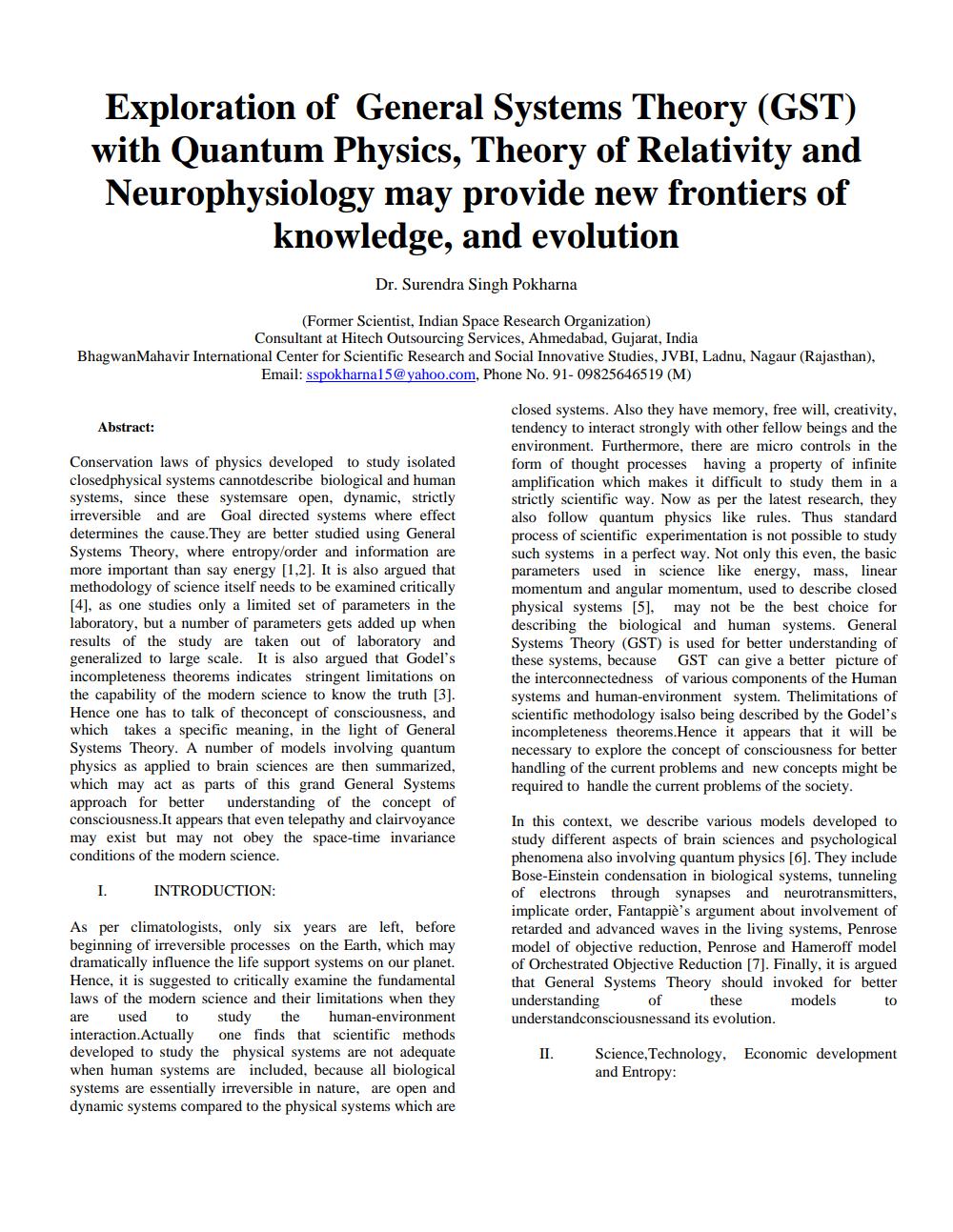________________
Exploration of General Systems Theory (GST) with Quantum Physics, Theory of Relativity and Neurophysiology may provide new frontiers of knowledge, and evolution
Dr. Surendra Singh Pokharna
(Former Scientist, Indian Space Research Organization) Consultant at Hitech Outsourcing Services, Ahmedabad, Gujarat, India
Bhagwan Mahavir International Center for Scientific Research and Social Innovative Studies, JVBI, Ladnu, Nagaur (Rajasthan), Email: sspokharna15@yahoo.com, Phone No. 91- 09825646519 (M)
Abstract:
Conservation laws of physics developed to study isolated closedphysical systems cannotdescribe biological and human systems, since these systemsare open, dynamic, strictly irreversible and are Goal directed systems where effect determines the cause. They are better studied using General Systems Theory, where entropy/order and information are more important than say energy [1,2]. It is also argued that methodology of science itself needs to be examined critically [4], as one studies only a limited set of parameters in the laboratory, but a number of parameters gets added up when results of the study are taken out of laboratory and generalized to large scale. It is also argued that Godel's incompleteness theorems indicates stringent limitations on the capability of the modern science to know the truth [3]. Hence one has to talk of theconcept of consciousness, and which takes a specific meaning, in the light of General Systems Theory. A number of models involving quantum physics as applied to brain sciences are then summarized, which may act as parts of this grand General Systems approach for better understanding of the concept of consciousness. It appears that even telepathy and clairvoyance may exist but may not obey the space-time invariance conditions of the modern science.
I.
INTRODUCTION:
As per climatologists, only six years are left, before beginning of irreversible processes on the Earth, which may dramatically influence the life support systems on our planet. Hence, it is suggested to critically examine the fundamental laws of the modern science and their limitations when they are used to study the human-environment interaction. Actually one finds that scientific methods developed to study the physical systems are not adequate when human systems are included, because all biological systems are essentially irreversible in nature, are open and dynamic systems compared to the physical systems which are
closed systems. Also they have memory, free will, creativity, tendency to interact strongly with other fellow beings and the environment. Furthermore, there are micro controls in the form of thought processes having a property of infinite amplification which makes it difficult to study them in a strictly scientific way. Now as per the latest research, they also follow quantum physics like rules. Thus standard process of scientific experimentation is not possible to study such systems in a perfect way. Not only this even, the basic parameters used in science like energy, mass, linear momentum and angular momentum, used to describe closed physical systems [5], may not be the best choice for describing the biological and human systems. General Systems Theory (GST) is used for better understanding of these systems, because GST can give a better picture of the interconnectedness of various components of the Human systems and human-environment system. Thelimitations of scientific methodology isalso being described by the Godel's incompleteness theorems. Hence it appears that it will be necessary to explore the concept of consciousness for better handling of the current problems and new concepts might be required to handle the current problems of the society.
In this context, we describe various models developed to study different aspects of brain sciences and psychological phenomena also involving quantum physics [6]. They include Bose-Einstein condensation in biological systems, tunneling of electrons through synapses and neurotransmitters, implicate order, Fantappiè's argument about involvement of retarded and advanced waves in the living systems, Penrose model of objective reduction, Penrose and Hameroff model of Orchestrated Objective Reduction [7]. Finally, it is argued that General Systems Theory should invoked for better understanding of these models to understandconsciousnessand its evolution.
II.
Science, Technology, Economic development and Entropy:




